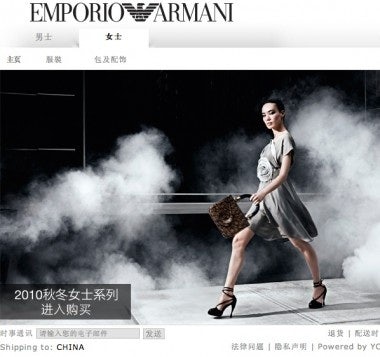Armani Is Latest Brand To Add Online Shopping To Chinese-Language Site#

A relatively strong yuan, duty free shopping and better selection are among the top reasons that visitors from mainland China give for their cross-border shopping sprees in Hong Kong. While Hong Kong retailers have welcomed these free-spenders with open arms -- not surprising, considering the money they made from the record 662,248 mainland Chinese who traveled to the city during the recent "Golden Week" holiday -- luxury brands, many of which have sunk millions into the mainland China market, would like to see Chinese shoppers spending locally. However, stemming this Hong Kong-bound tide has been anything but easy.
Earlier this year, Bain and Company's Bruno Lannes and Xuan Wang commented on the complexity of this issue for major brands, noting that many luxury brands have essentially shifted their focus to second- and third-tier cities in the hopes of finding "captive" markets:
Chinese consumers continue to spend more on luxury goods purchased abroad than at home. According to the China Luxury Market Study by Bain & Company, in 2008, the domestic market totaled US $8.6 billion, equaling about 40 percent of all mainland luxury spending, while 60 percent was spent in overseas. Most striking is that as incomes rise, households continue to opt to buy luxury goods overseas where they find lower prices. Most domestic purchases are either impulse buys or made by shoppers who want access to good local service after the sale.
Mainland retailers are hard-pressed to compete with foreign merchants who offer significantly discounted prices and broader product selection. For example, the discounted price of one luxury brand during seasonal sales in Hong Kong is about 60 percent of the regular price in mainland outlets.
A more recent Bain study reiterated the importance of smaller cities for retail sales, noting that cities like Zhuhai, Wuxi, Qingdao or Chengdu are the "new battleground" for luxury brands. As Monocle contributor Justin Bergman wrote this week, shifting into a second- and third-tier market-focused strategy is something brands are doing for pragmatic reasons, though they risk brand dilution and alienating "early adopters" in cities like Beijing and Shanghai:
Why the shift in spending patterns across the country? For one, wealthy Chinese in the country’s biggest cities tend to do their shopping overseas, where prices are generally lower and the selection better. Also, these consumers are developing more sophisticated tastes, increasingly preferring the harder-to-get Diane von Furstenberg to Louis Vuitton.
“The brands know that in some ways it’s old hat to have an LV bag, so going to second- and third-tier markets is what they have to do,” says Avery Booker, the New York-based editor of jingdaily.com, a website that covers the luxury industry in China, “Even brands you wouldn’t expect like Bottega Veneta are going to Chengdu.”
But is expansion into smaller cities, and a grudging acceptance that potential sales in China's richest cities will be redirected to Europe or Hong Kong, the way it has to be? For some brands, the strategy going forward hinges on online shopping, a relatively new entrant to the China luxury market. Though e-commerce platforms like Taobao have thrived for years, mainly because of the popularity of its proprietary Alipay system (comparable to PayPal), only a select few high-end brands currently offer online shopping on their Chinese-language websites.
As Joel Backaler wrote earlier this year in his China Observer blog,
Websites like Taobao.com are often used by more price-sensitive consumers, however e-commerce in the luxury good sector correlates closely with convenience and access. For instance,
wooha.com
is a popular e-commerce site with a luxury-focused section selling Coach, Prada, Burberry, Cartier, Armani and others. This is just one example, but there will likely be others.
Though a stronger emphasis on e-commerce is either highly likely, or inevitable in China, depending on who you ask, brands have been extremely slow to add the feature to their local websites. As the L2 Digital IQ Index found this year, although 80 brands have a Chinese language website, only 40 promote brand events within China, only 42 are mobile enabled and only 10 are e-commerce enabled. Even Coach -- which has seen its China sales explode recently -- lacks an online store on its Chinese-language site, though this feature is enabled on the Japanese site.
But adoption of e-commerce functionality in the China market is slowly moving ahead. This week, Emporio Armani is launching its Yoox-managed, Chinese-language online shop. Although mass-market and fast-fashion brands like the Gap and Wal-Mart have recently created e-commerce sites for China, Armani's online venture is one of the first by such a high-profile fashion brand. From the AFP:
Online retail sales in China, which has the world's largest web population of at least 420 million, soared 117 percent last year to 39 billion dollars (29 billion euros), according to iResearch, a Beijing-based research firm.
US fashion giant Gap launched an online store in China earlier this month and Wal-Mart -- the world's biggest retailer -- has said it too plans an Internet presence in China soon. Apple opened an online store in October.
Armani said it was "the first fashion brand to offer a 'flagship store' online experience in China." The website is backed by Yoox, an Italian online fashion retailer that has grown rapidly during the global economic crisis.
Whether Armani's venture pays off -- and whether other brands follow suit -- will remain to be seen, but if these online stores offer selection comparable to what's found in stores around the world and price somewhat competitively, they could potentially offset the brick-and-mortar sales they're currently losing to retailers in Hong Kong or elsewhere.